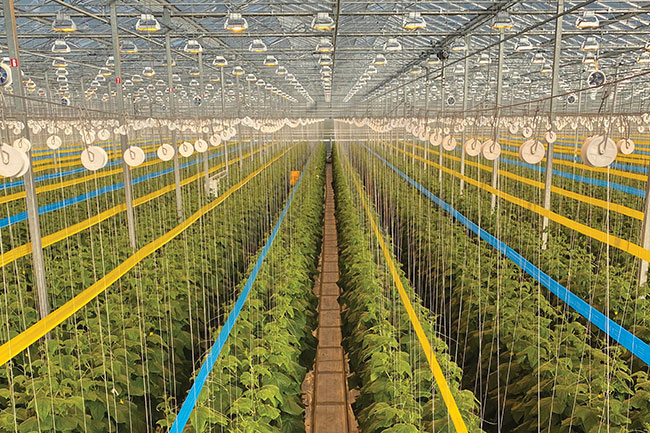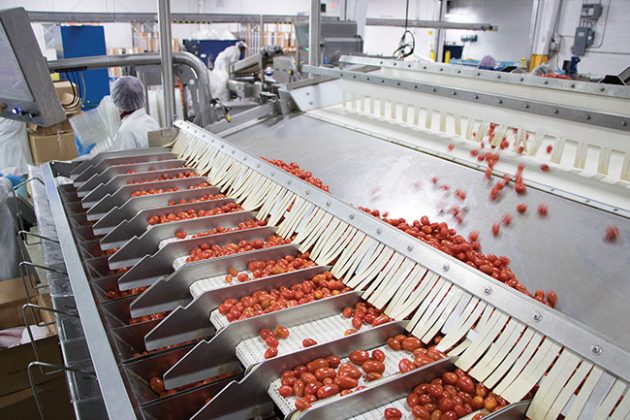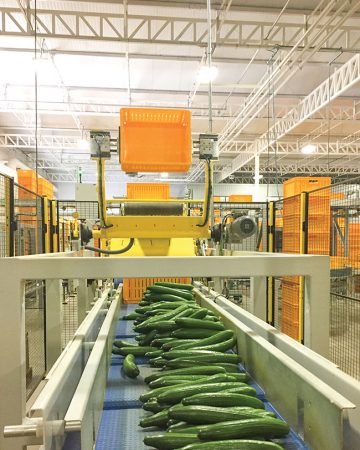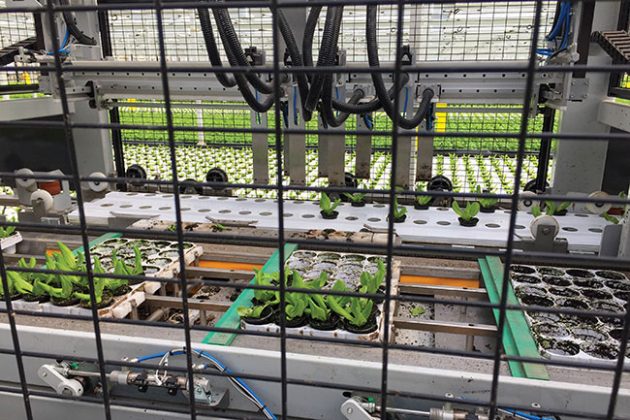
Features
Business
Grower Profiles
Handling Systems
Labour
Lighting
Structures & Equipment
Acceleration by technology
Using lighting, automation and data, Mucci Farms meets the rapidly growing demand for fresh greenhouse produce.
March 23, 2021 By Ajit Saxena
 The lit culture program at Mucci Farms has dramatically changed the way they grow. All photos: Mucci Farms
The lit culture program at Mucci Farms has dramatically changed the way they grow. All photos: Mucci Farms Today, almost every industry in the world can attribute a significant amount of their success and progress to the advancement of technology.
Among the major industries in Canada, the manufacturing, service and energy sectors have each grown tremendously, in large part due to the rapid growth of automation, robotics and data analysis through advanced hardware and software. However, one industry that isn’t often thought of when discussing technological progress, is the agriculture industry. More specifically, the greenhouse agriculture industry.
As poly-greenhouses and fully manual labour of decades past begin to fade from the industry standard, more robust high-tech glass facilities are becoming common place with a variety of technological advantages that assist in all aspects of greenhouse farming.
Kingsville, Ont.-based Mucci Farms, a greenhouse grower with over 60 years of experience, has been at the forefront of new technological advancements. Centered around lit culture and a heavy dose of automated harvesting, sorting and packaging, the company employs a forward-thinking mindset and aggressive commitment to finding the best available solutions for all areas of their vertically integrated operation.
“Improving efficiencies in every area of our business has been paramount to our growth strategy,” says Bert Mucci, CEO of Mucci Farms. “Market demand today is focused on quality, maximum shelf life, local and regional production, corporate social responsibility and safe growing practices. All of these priorities are dramatically improved by the impressive innovation in automation and tech for the fresh produce industry.”
Modern technology in their greenhouse space is largely centered on controlling and creating optimal growing conditions for healthy plants, maximizing yield, speeding up production times, and minimizing environmental impact.
“Greenhouse farming is highly sustainable at its core. We use rockwool and coconut husk growing mediums, we don’t spray any harmful treatments on any of our crops, we use less water which we disinfect with UV and recirculate so nothing is flushed out into our lakes,” Mucci explains. “Not only does technology help us with sustainability, it maximizes our production as well. We produce over 15 million pounds of tomatoes from a 25-acre block which is 10 times the production of a field farm, all made possible by the data we have as a result of greenhouse tech.”

Access to data and optimization software has allowed the vertically integrated greenhouse producer to improve efficiencies both during production and post-production.
Spotlight on lit culture
With an emphasis on maximizing local and regional production during the winter months, Mucci Farms makes annual investments to expand their lit culture program, which boasts the largest acreage of supplemental grow lights in the North American greenhouse industry. In addition to a large percentage of their Ontario greenhouses under lights, their first project in the United States, specifically in Huron, Ohio, is growing tomatoes on-the-vine throughout the winter months.
“Grow lights have dramatically changed the entire dynamic of our industry because all of a sudden, we could grow the same tomato in the same facility in July and January,” remarks Mucci. “We began trialing grow lights a little over five years ago with mini cucumbers and haven’t looked back. Today we have several varieties of cucumbers, tomatoes and lettuce under lights, and we are currently trialing bell peppers which would be another game changer.”
The company predominantly uses high pressure sodium (HPS) lights as well as LED depending on the crop. The controlled environment is beneficial for optimizing growing conditions, and the use of diffused glass also plays a role in improving production and quality.
“Diffused glass on top of our greenhouses increases our production by eight per cent as a result of having much more uniform light throughout the plant canopy. This also creates favourable conditions by reducing stress on the plants. In fact, we can actually grow a more consistent product under lights in the winter because of minimal fluctuations in the growing environment,” says Mucci.
On the sales and marketing side, the lit culture program has been instrumental in securing and reinforcing partnerships with retailers.
“One of the greatest challenges for our partners is consistent supply. Growing locally in the winter has allowed us to deliver fresh produce 365 days a year,” explains Joe Spano, VP of sales & marketing. “We can forecast production a lot more efficiently, and with sustainability at the top of everyone’s minds these days, growing locally during the winter reduces food miles and our impact on the environment—a great selling feature to today’s demographic that is increasingly more interested and aware of what they eat and where their food comes from.”
Bringing in robotic help
Technology and robotics also play a significant role in automating major tasks related to harvesting, packing, labeling and palletizing. At Mucci Farms, automation is on full display in all of their operations, but none more than their state of-the-art cucumber facility.
“Automation in our cucumber range starts at harvesting. Our team harvests product into the carts, which are automatically delivered to the pack lines via induction wire by a driverless M-Track or Bumble Bee train,” explains Guy Totaro, grower manager of cucumbers at Mucci Farms. “The system scans the tag on the carts to identify the product when it’s being offloaded and then sorts it for the appropriate pack line. Our team then grades and packs it and our automatic palletizer uses infrared technology to determine the pallet configuration.”
The entire automation system was built as a proprietary unit and greatly assists with efficiency in labour, cost, and production time. As the agricultural industry is predominantly located in rural regions with small populations, finding skilled and unskilled labour has been an ongoing challenge for all of Canada’s farming industry.

Automation of the produce sorting and packaging process is a key part of reducing labour needs and improving efficiency.
“Finding labour can be challenging in our area, so technology really helps us close the gap by automating some of the mundane tasks. This helps us maximize the expertise of our team members by placing them in the highest areas of need while robots can do many of the less desirable tasks,” says Totaro.
A macro benefit of deploying technology in the greenhouse space is to provide growers with the ability to manage larger acreages and larger teams.
“My team is a lot more efficient because many of the tasks that would have been back-breaking work in previous decades, has been addressed by automatic scissor lifts and waist-high troughs. On the management side, we use the Priva system which is an excellent labour management platform that allows us to be much more efficient and productive,” explains Totaro. “It makes things easier and quicker and raises the level of our team, since we have to train many of them to operate the tech. In the past, we could only handle a small acreage, but the Priva environmental computer allows me to handle a much larger acreage with the same efficiency.”
Packaging automation is another high impact area of technology for Mucci Farms.
“The advancements made for packaging have been extremely beneficial for a variety of reasons,” says Mucci. “We’re working with delicate fruits and vegetables so the less hands that touch the product, the better. The technology has become so sophisticated that we can weigh, sort and pack products with little to no product handling, which maximizes quality, reduces shrink, and most importantly, speeds up production times.”
One of the most impressive packaging automation machines at Mucci Farms is on their mini cucumber line. This unit uses infrared technology to determine the size, diameter and weight of each mini cucumber and packs a perfect six-count tray using suction cups to move product from the line to the tray. “The mini cucumber automation always draws a lot of attention when we have tours. I think we are just scratching the surface on what’s to come as the technology continues to develop,” says Mucci.
Making data-driven decisions
Herney Hernandez, grower manager for lettuce and tomatoes at Mucci Farms, points out that access to data, and the software that organizes the information, is another driving force behind efficiency through technology.
“I have so much data at my fingertips, and it helps me make informed decisions when it comes to adjusting the temperature, monitoring the air, the light, our integrated pest management system and any environmental considerations we may need to take,” he says.
“Recently I’ve been using the demo of E-Gro which provides me with the most important information on plant growth, so I can accomplish the most important task, which is to maximize our yield. The conditions module gives me a quick overview of growing conditions, irrigation strategies and the balance of plants, which is imperative so that I’m aware in real-time if plants are growing optimally.”

Automated from planting to harvest, the lettuce farm has cut down their labour needs from over 20 people to eight.
Mucci Farms’ lettuce facility is a proprietary deep-water culture system that completely automates the process of sowing baby plants, transplanting them from the nursery into the pond and then harvesting after 18 to 22 days based on the time of year. “We used to have over 20 employees in our lettuce farm, but our automation system reduced that number to eight,” said Hernandez. “We use LED lights in this farm and grow multiple varieties of lettuce 365 days a year, thanks to all of the advancements with technology.”
Mucci Farms remains on the leading edge of the greenhouse industry in innovation and robotics to improve all facets of their vertically integrated company. With a focus on maximizing efficiency to accommodate their retail partners and consumers, there is no question that technology will continue to be the centerpiece of their efforts.
“The only question left is, how much better will it get?” says Mucci.
Ajit Saxena is the public relations and digital marketing manager at Mucci Farms. After six years in the fresh produce industry, he continues to be fascinated by greenhouse farming, particularly in how automation and technology can produce consistent, high quality vegetables year-round, while addressing food safety and sustainability demands in the marketplace.
Print this page